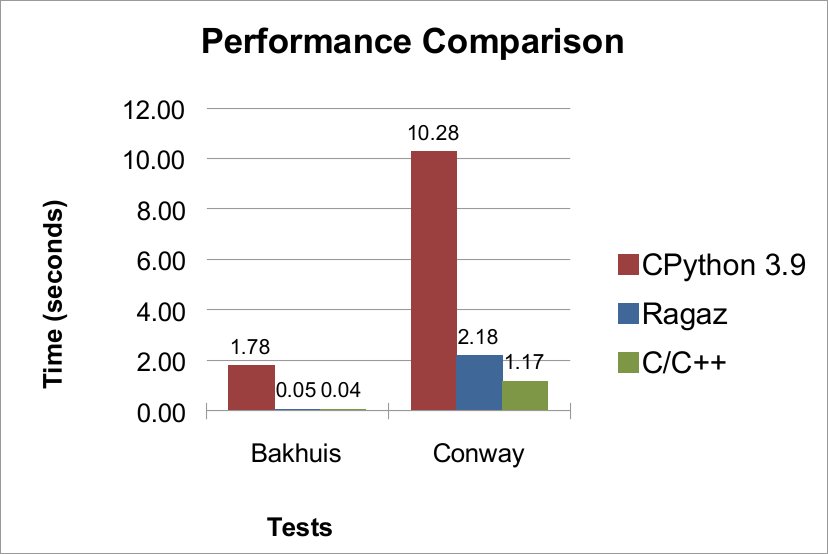Ragaz aims be a fast, safe and powerful language with python-like syntax which allow you to create from simple scripts to complex systems in a code easier to read, write and maintain than other system languages (C/C++, Rust, etc) with the same purpose.
Its strengths:
- Runtime speed equal to or close to languages like C/C++ or Rust.
- Compiling a Python project to pure executable code (using LLVM) without the need for virtual machines, wrappings, decorators, and other extras to distribute your software.
- Code that runs on multiple processors (because there is no GIL).
- Rust-like memory management that eliminates garbage collector, improves runtime speed and prevents memory access bugs.
With these requirements already being in Ragaz, even creating an operating system in a python-like syntax would be feasible, for example. As a proof of concept, the built-in functions and types themselves are all already written in Ragaz (look this), and soon, the entire standard library will also be written in Ragaz.
In short words, Ragaz is a dialect of Python with features that allow your pythonic code run on bare metal. This is possible because the compiler converts Ragaz code to binaries using LLVM as intermediate language.
This chart comparing Ragaz's performance with the official version of Python and C/C++. As you can see, the program compiled in Ragaz is dozens of times faster than the default implementation of Python 3.9 and with a speed equal to or close to that of C/C++.
See a hello world in Ragaz:
def main():
print("Hello World")
To compile, just run the following:
ragazc compile examples/hello_world.zz
# output:
Hello World
The learning curve for Ragaz is very smooth. We invite you to check our Get Started guide. We believe that in a short time you will have a good clue about the Ragaz works.
Ragaz works on:
- Linux x86 and 64bit
- Windows (partially: try/except statements are failing because compiler's error handling need be updated to
- support Windows)
And have the following dependencies:
- Python (3.9 or later)
- LLVM/Clang (11.0 or later)
To install Ragaz, download and open the repository and just run the following:
python setup.py install
To check whether installation was successful, just run the following:
# From the root of the repo:
python test.py
If you liked the projet and would like accelerate the Ragaz development, we will appreciate your finantial support in order to we dedicate full time to this project with no distractions. We also welcome companies that wish sponsor the project.
https://www.patreon.com/RagazLang/
If you are a developer, any help is welcome to our project. Contributions include since developing new features, bug fixes and refactoring until write documentation and manage tools like git and build artefacts. You can start reading the documentation to be familiar with the code and check the list of issues to see which interest you and then pick it.
Is my Python module compatible to Ragaz?
Although Ragaz try to be the closest possible to original Python language unfortunately some default Python features won't fit the Ragaz purpose, and thus you'll find some strict rules not present on default Python language and even will find new features like variable mutability and borrowing present in languages like Rust. Thus, all will depend on your code. When you import pure Python modules into a Ragaz module, Ragaz will try to compile them. If there is any code that is not accepted on Ragaz, errors will be emitted by the compiler. But don't worry, the adaptation from Python to Ragaz code is not a hard job and the compiler will be your friend.
Is Ragaz really fast?
Compared to other pyhtonic tools, Ragaz is faster (or have similar performance) than many of them because these tools try to keep compatibility to Python code that is very high level but not much efficient, this force they to use a lot de overload to create automatic conversions among other drawbacks. Ragaz doesn't worry about keep compatibility with all Python features rather it forces user to strictly type her variables, encapsulate code into functions, discard garbage collection, etc. As a result user has a code that is straight-forward and thus fast because it uses fewer instructions to run.
Even when compared to system languages like C/C++, Rust, etc, Ragaz has a pretty similar performance as you even can using our benchmarking examples.
Can I import modules compiled by other languages like C, C++ or Rust?
Yes, of course! You declare these modules on dependencies file and then normally import these on your Ragaz file as if they were Python modules.
Can I have parallelism using multiprocessing with Ragaz?
Yes! As Ragaz doesn't use GIL (Global Interpreter Lock) your code can simultaneously run in multiple processors.

